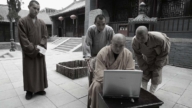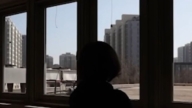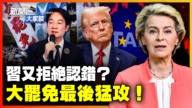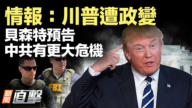【新唐人2011年10月17日讯】中共十七届六中全会10月15号在北京召开,将在4天的会期讨论解决文化问题的政治途径。这是继1996年十四届六中全会讨论所谓的思想道德和文化建设问题之后,中共再次聚焦文化议题,政治意义备受外界关注。分析人士认为,这是中共面临执政危机,要进一步加强意识形态控制,尤其是媒体和网路监管的表现。
针对北京刚召开的六中全会有关文化议题的讨论,一些专家表示,中共当局在面对互联网时代日益增长的挑战,尤其是微博的兴起,中共试图找到更好的办法来控制传媒。
《法新社》表示,作为文化建设和文化体制改革的一部分,监管网路将是中共当局的重要思路。特别是中国目前网民人数已有5亿人,而微博用户则超过2亿人,中共对网路影响民意的能力越来越担心。
北京文化学者凌沧州对《美国之音》表示,中共以文化建设作为议题的举动,在一定程度上体现了中共领导层的忧虑。他说,执政者认识到中国社会目前在道德、文化方面存在很多问题,比如普遍追求物质和功利、信仰缺失、社会整体处于一种浮躁的状态。
《北京之春》杂志主编胡平表示,这样的会议不可能解决问题。
《北京之春》杂志主编胡平:“(中共)官方意识形态本身的这种千疮百孔,这种破产。那麽它就缺少一样东西,那麽它开这个会就是想解决这个问题。要确立一种,给它的主旋律填充一些更确定的内容。它就是用这种方式来加强文化方面的这种控制,另外,也是用这个东西在国际社会去对抗民主国家自由社会的这种普世价值。”
有舆论认为,中国现在面临的是如何处理中共的党文化、正统的中国古老文化和西方现代文化三者之间关系的问题。
时事评论家章天亮表示,有共产党在,中国就不可能成为文化强国,真正提升软实力。因为中共的文化价值观和中国5000年深厚的传统文化格格不入。
章天亮:“如果中国真的有一个很好的文化的话,她本身就会对中共的政权造成威胁,所以中国如果真正要实现文化崛起,而不是仅仅是所谓的经济崛起,而是说中国真正能够在世界国际社会中展现她的软实力。就是她的文化的这种亲和力,道德的亲和力等等这些方面的话,只要中共存在一天,这是不可能实现的。”
《BBC》中文网引述香港政治评论人士林和立的观点指出,中共所谓文化改革的目地,就是要确保它的媒体、公共宣传机构、影视业以及互联网等为党服务。这实际上意味着中共更加严格的控制所谓“言论自由”。
胡平认为,这就是共产党自己说的,要加强文化上的软实力,并进一步控制。
胡平:“首先对他看不顺眼的,觉得对共产党专制有影响、有威胁的这些其他的文化、思潮和文化的形式,加以压制,以确立这种所谓主旋律的主导地位,我肯定他不是进一步开放的表现,而相反是进一步压制,进一步控制的表现。”
美国布鲁金斯学院李成教授向《BBC》指出,中共领导人面对网路媒体这一重大挑战,希望能通过六中全会,找到某种对策和达成策略性的共识。
新唐人记者林莉、李明飞、王明宇采访报导。
17th National Congress Talk on Culture Reveals Heightened Censorship
The 17th National Congress of the Communist Party
of China took place on Oct. 15 in Beijing.
During the 4 day session, political measures
to resolve cultural issues will be discussed.
Since the 14th National Congress in 1996,
the CCP discussed so-called culture and ideology,
and the CCP once again targets cultural issue.
Its political significance has caused much attention.
Analysts believe the CCP is facing a power crisis.
It intends to further strengthen ideological control,
particularly its capacity to monitor media and internet.
(Voice) Regarding the current CCP National Congress
in Beijing, there are concerns about the cultural issues discussed.
Facing the ever growing challenge of the internet era,
especially the rises of Weibo, or microblogging (a mix of twitter and face book),
experts believe the CCP intends to heighten media control.
L’Agence France-Presse (AFP) indicates as part of culture
and ideology reform, to monitor internet is essential to the CCP.
In China, there are 500 million internet users,
and over 200 million microblogging users.
The CCP worries more and more about its impact
on domestic opinion.
Beijing scholar Ling Cangzhou indicated
to “Voice of America," that the CCP’s talk on culture reflects
its concern over the leadership to a certain extent.
He said the authority recognizes Chinese social issues
in morality and culture, including materialism, utilitarianism,
lack of belief, and that the whole society is impulsive
and in a state of unease.
Hu Ping, editor of “Beijing Spring" magazine,
said that such a meeting can not solve the problem.
“Beijing Spring" magazine editor Hu Ping:
“(CCP) official ideology itself is full of cracks. It’s a bankruptcy.
It is missing something which they intend to fix with the meeting.
They wanted to ensure and fill the theme with some content.
This is how they strengthen the control in culture.
Besides, this is also how they fight the democratic countries
and the free society in the international community."
There are criticisms that what China faces is how to deal with
the relationship among the party culture of the CCP, the orthodox,
ancient Chinese culture, and the modern Western culture.
Commentator Zhang Tianliang indicates, with the Communist
Party, China will never become a cultural power or elevate its soft power.
This is because the CCP’s cultural values are incompatible to
the 5,000 years of profound traditional Chinese culture.
Zhang Tianliang: “If a good culture really exists in China,
she will impose a threat to the CCP regime.
If the true culture, not just so-called economic rise,
is realized in China, China will truly demonstrate her soft power on the world stage.
However, as long as the CCP exists, it is impossible for
China to achieve the affinity of culture or morality."
“BBC" network quoted the Hong Kong commentator
Wily Lam’s point of view.
“The CCP’s so-called cultural reform is to ensure the media,
the public advocacy organizations,
the film and television industry,
and the internet are at the service of the party.
This actually means CCP is more strictly controlling
so-called “freedom of speech."
Hu Ping believes this is what the CCP is referring to;
to enhance cultural soft power for further control.
Hu Ping: “First is to suppress those cultures, ideas,
and cultural forms that they don’t like, have impact on,
or pose threat to the communist dictatorship,
so that they could establish their theme in leadership.
I am certain this is not an act of being open, but,
on the contrary, to further suppress and further control."
Professor Cheng Li of Brookings Institution indicated to
the “BBC" that facing the major challenge from the internet,
the CCP leaders are hoping to reaches a consensus about
a strategic measure through the 17th National Congress.
NTD Reporters Lin Li, Li Mingfei and Wang Mingyu






























